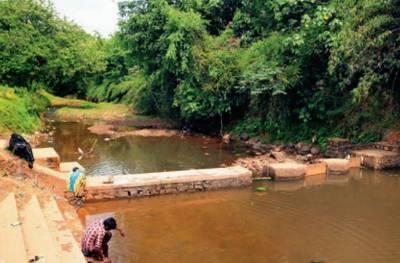
Bengaluru :
The first drought reported in the recent history of Kodagu district, the birthplace of river Cauvery, seems to have woken up the state government, spiritual organizations and environmentalists.
In what is believed to be a first-of-its-kind initiative, they have joined hands to take up conservation and management to rejuvenate and restore the river, considered the state’s lifeline, to its former glory. The plan is to restore the flora and fauna of the river’s tributaries in Kodagu with native trees, shrubs and flowers, besides controlling erosion, curbing water-intensive crops like paddy and restricting sand mining in the waterbody.
“In association with the Art of Living and Kodagu district administration, we have started a five-year programme for the restoration of the river which has shrunk into a narrow strip over the years due to poor monsoon and unrestricted sand mining activities,” said C G Kushalappa, dean of College of Social forestry, Ponnampet, Kodagu, which is attached to University of Agricultural and Horticultural Sciences, Shivamogga.
To start with, Kushalappa said they have chosen a 1km stretch on the banks of river Lakshmanatirtha, a major tributary of Cauvery in Kodagu, starting from Nittur village towards Srimangala in Virajpet taluk. Depending on the success of this pilot project, it will be gradually extended to other parts of Kodagu where the river flows.
Kushalappa said conservation work would be taken up across 20 metres on both sides of Lakshmanatirtha for five years. “As part of the programme, we’ll visit farmers/planters and request them to give up paddy cultivation close to the river by offering them monetary incentives. They’ll also be encouraged to go for horticulture crops,” he added.
To ensure a free-flowing river, an action plan has been charted out that includes curbing soil erosion and pollution, planting trees and shrubs of local varieties that existed close to the river since ages and curbing sand mining and fishing activities. “We have to treat different areas differently. While in some areas, rebuilding bunds will be the priority, in others, plantation, including bamboo and pongamia pinnata (honge tree), may be needed. While there are areas where we need to stop pesticides from entering the water, others have issues of encroachment,” said Guddappa M Devagiri, who is overseeing the drive.
That’s not all. Sadhguru Jaggi Vasudev’s Tamil Nadu-based Isha Foundation, which was part of an initiative by the Madhya Pradesh government to restore river Narmada, is reportedly is in talks with the government to launch a similar initiative in Karnataka, said a senior official of Kodagu Zilla panchayat.
He said the foundation plans to take up a massive tree plantation drive on the banks of Cauvery from Bhagamandala, the confluence of three rivers (Cauvery, Kanika and the Sujyothithe) in Kodagu to Krishnaraja Sagar reservoir in Mandya by involving volunteers. “This project would also involve cooperation from people living in nearby areas, saints and ashrams that have been active in Narmada conservation and all those who care for river conservation and management,” he added.
source: http://www.timesofindia.indiatimes.com / The Times of India / News> City News> Bangalore News / by ManuAiyappa Kanathanada / TNN / July 13th, 2017

